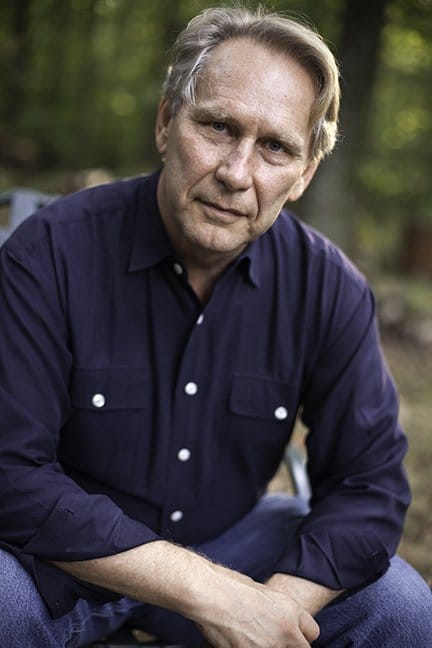
Q&A with Douglas Wissing, Author of IN Writing
When he isn’t dodging bullets in Afghanistan while reporting on the war there, Douglas Wissing frequently writes about his home state. One of the IU Press’s Bicentennial books, Wissing’s IN Writing: Uncovering the Unexpected Hoosier State explores Indiana and its connections to the larger world. Ahead of the author’s appearance in Indy this Wednesday, we chatted with him about his new collection of stories, war reporting, and life at home.
Your writing career often takes you to Afghanistan, and it seems you’re constantly traveling between two very different worlds. What’s your daily life like?
I’m both rooted and fancy-free, I guess. I live in a historic district of Bloomington called Prospect Hill, where I have an 1860s Greek revival cottage that I’ve lived in for a long time. When I have a book going or a big article, the research materials kind of colonize the entire house. Of course, I do a lot of international work as well. I was in Azerbaijan and in the Caucasus not too long ago. I recently traveled to a remote set of islands called the Gambier in French Polynesia. Last year, I was in Borneo. And yes, I spend a lot of time in Afghanistan reporting on the war there for my books. So I get around.
IN Writing is something of a departure from your recent war reporting in that it focuses on Indiana. What interests you about your home state?
I grew up in Vincennes, which was the first town in Indiana with a French fur trading post. My ancestors were fur traders, and we lived on Dubois Street, which was named after my family. My grandfather would take me down to the Wabash, and he would point upstream and say, “Your people came from Canada. They came down the rivers to this point.” Then he would point downstream, and say, “When I was a kid, Creole boys like us would get on boats and go down to New Orleans to see what a real Creole city looked like.” So I feel really rooted in Indiana, but I also understand our long connections to the larger world. Part of my career has been documenting those connections.
Most of the stories in IN Writing have been published elsewhere, including one from Indianapolis Monthly. But “Jihadis in Indiana” is original. What inspired you to write that piece and include it in the book?
Well, I had been gathering information on that subject a long, long time. During the Soviet War in Afghanistan in the 1980s, Indiana became a place where wounded mujahideen fighters came to recuperate. That was back when we thought of the Jihadis as the great holy warriors against the evil Soviets. We paid billions to support the mujahideen military. We formed secret partnerships with the Pakistanis and the Saudis to embellish that fundamentalist movement, to feed it, to help it grow to fight the Soviets. So, of course, it’s a classic case of unintended results. And we were a part of that. We tend to want to sweep those uncomfortable episodes in history under the rug, and I just wanted to remind people that the roots of where we are today, to a certain extent, come back to Indiana.
How did you choose the other stories for the book?
I put together a long list of previously printed articles, then I worked with the editors at the Indiana Historical Society and Indiana University Press, who were kind enough to co-publish the collection. I did the first cut, then the editors took a pass to come up with the right-sized book. It’s part of the Bicentennial celebration, and the publishers consider this to be almost an alternative history of Indiana, one in which you learn about unexpected aspects of the state.
The Bicentennial is as good an occasion as any to take stock of where Indiana stands. How are we doing as a state?
We’re clearly at an important juncture. Our manufacturing tradition has been severely impacted by globalism. Our agricultural tradition has morphed over the last 30 years into what is essentially industrial activity. Indianapolis is going through its own dynamic phase.
Where do you think Indiana is headed?
You know, I typically tell people I’m trained as a historian.
What’s your next writing project?
I have a book on Afghanistan, Hopeless but Optimistic, coming out this fall. With my first book on the war, Funding the Enemy, I was one of the early critics discussing our complete failure there—the failure of the counterinsurgency. Now it has opened up a discussion in policy-making circles, and there’s a general acceptance that we failed. It has even informed our decision about whether to go into Syria. So I wanted to go back to Afghanistan because we still have 10,000 soldiers there—and that doesn’t include an equal number of special operations people or twice as many private contractors. We still have an enormous presence there, and I wanted to understand how people operate, knowing that we’ve failed. That’s the hopeless part. The optimistic part is me in the besieged part of Kabul going around and trying to find things that have worked—enduring, sustainable projects that can potentially help the Afghan people for decades. I did manage to find some.
Sounds like you’re busy. You’re still going to be able to deliver your next feature for Indianapolis Monthly on time, right?
I’m taking deep breaths; I do have a lot going on right now.





